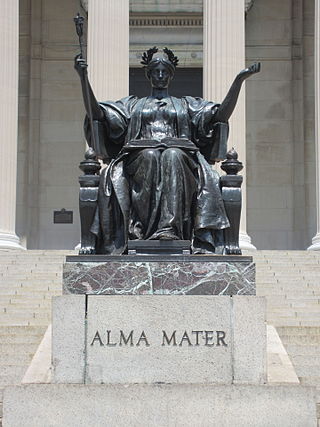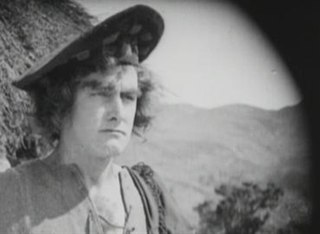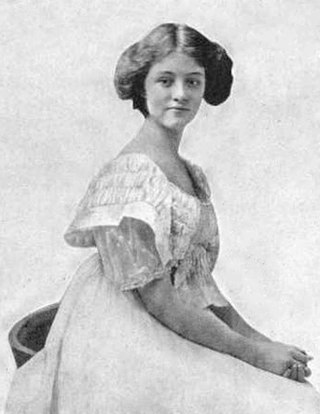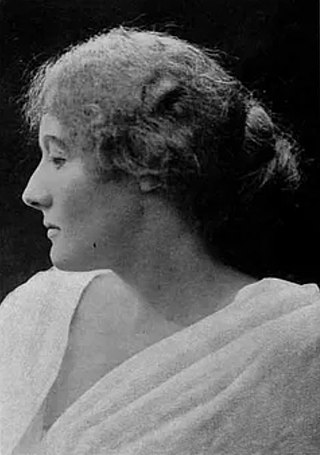Related Research Articles

In Greek mythology, Thalia, also spelled Thaleia, was one of the Muses, the goddess who presided over comedy and idyllic poetry. In this context her name means "flourishing", because the praises in her songs flourish through time.

Alma mater is an allegorical Latin phrase meaning 'nourishing mother'. It personifies a school that a person has attended or graduated from. The term is related to alumnus, literally meaning 'nursling', which describes a school graduate.

The Most Exalted Order of the Star of India is an order of chivalry founded by Queen Victoria in 1861. The Order includes members of three classes:
- Knight Grand Commander (GCSI)
- Knight Commander (KCSI)
- Companion (CSI)
Victor Benjamin Neuburg was an English poet and writer. An intimate associate of Aleister Crowley, he wrote on the subject of occultism, including Theosophy and Thelema. He edited "The Poet's Corner" column in the Sunday Referee, and also published the early works of Dylan Thomas and Pamela Hansford Johnson.

Morning dress, also known as formal day dress, is the formal Western dress code for day attire, consisting chiefly of a morning coat, waistcoat, and formal trousers for men, and an appropriate gown for women. Men may also wear a popular variant, where all parts are the same colour and material, often grey, and usually called "morning suit" or "morning grey" to distinguish it; considered properly appropriate only to festive functions, such as summer weddings and horse races, which consequently makes it slightly less formal. The correct hat would be a formal top hat, or if on less spacious audience settings, optionally a collapsible equivalent opera hat.

Bernard Arthur William Patrick Hastings Forbes, 8th Earl of Granard,, styled Viscount Forbes from 1874 to 1889, was an Anglo-Irish soldier and Liberal politician.

Basil Sydney was an English stage and screen actor.

The Boeotian helmet was a type of combat helmet used in Ancient Greece and Greek-influenced regions during the classical and Hellenistic periods, as well as in Ancient Rome; it possibly originated in the Greek region of Boeotia.

The 1914–1918 Commemorative war medal was awarded to soldiers and sailors for service in World War I. It was also awarded to civilians who met certain requirements. Created by Act of June 23, 1920, it was awarded to any military member for service between 2 August 1914 and November 11, 1918. It is also given to civilians who served in the same period in the army or the Interior.

Hubert Willis was a British actor best known for his recurring role as Doctor Watson in a series of silent Sherlock Holmes films co-starring with Eille Norwood.

The Diamond Jubilee Medal was instituted in 1897 by Royal Warrant as a British decoration. The medal was awarded to members of the Royal Family and the court, guests and dignitaries present at the celebrations of the Diamond Jubilee of Queen Victoria and to selected soldiers and sailors who formed the jubilee parade in London.

David Hawthorne was a British stage and film actor. He played the leading man in a number of films during the silent era, but later switched to character roles. One of his more notable roles was that of Rob Roy MacGregor in the 1922 film Rob Roy.

The Golden Jubilee Medal was instituted in 1887 by Royal Warrant as a British decoration to be awarded to participants of Queen Victoria's golden jubilee celebrations.

The Poplar Rates Rebellion Mural is a mural in Hale Street, Poplar, London, London. It is painted on the wall of the depot of Tower Hamlets Parks Department.

Doris Lytton was an English actress on stage and in silent films, and a businesswoman in the 1920s. Later, as Doris Lytton Toye, she wrote a cookbook tailored for post-war shortages, Contemporary Cookery (1947).
M'Lady is a 1921 play by the British writer Edgar Wallace. It is a drama about a woman who tries to raise her daughter in high society, only for her husband to return from Broadmoor where he has been serving a sentence for killing a police officer. It was panned by theatre critics.

Ivan Berlyn was an English actor of stage and silent film whose career spanned four decades. An experienced and versatile actor, Beryln played "... weird and eccentric character parts" in everything from pantomime to Shakespeare.

Hetta Bartlett was an English stage and film actress whose career spanned both the West End and Broadway. She is known for Sonia (1921), The Lady of the Lake (1928) and Honour in Pawn (1916).

Beatrice Mary Beckley was an English-born American actress of stage and screen.
Gerald Pring was a British stage and film actor. He played a number of supporting roles in British and American films during the silent and sound eras.